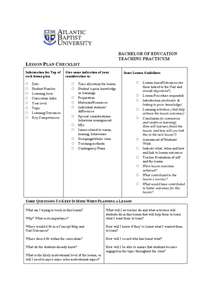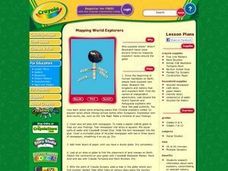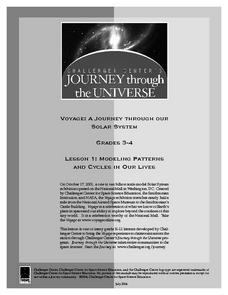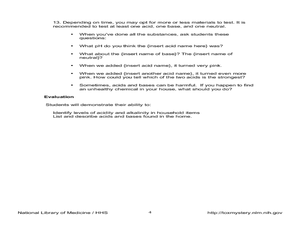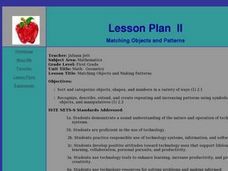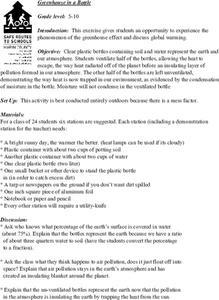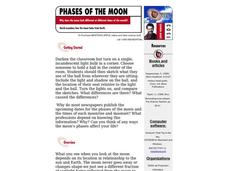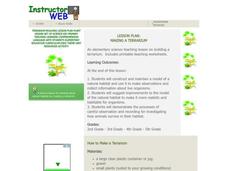Curated OER
Exploring Equivalent Fractions
An extensive lesson explores equivalent fractions and is intended for three 60-minute periods. Young mathematicians compare and order fractions with like and unlike denominators. Included are worksheets, assessments, and answer sheets;...
Curated OER
Invent an Animal
Students recognize how animal adaptations help animals survive in their environment. In this characteristics lesson, students create an original animal that can adapt to a specific habitat. Students create a model of their...
Curated OER
Rounding Decimals
Fourth graders engage in a lesson that is about the concept of rounding decimals. They review place value and focus it upon the practice of rounding. Students use 10 base decimal grids or models to help make connections with the skill.
Curated OER
Mapping World Explorers
Students research early explorers from selected nations, routes, or time periods. After finding maps of exploration routes over water and land, they create a time line. Presentations are created in the form of three-dimensional models...
Curated OER
Modeling Patterns and Cycles in Our Lives
Students explore how building a model can help them better understand the natural world. They identify common cycles or patterns in nature as well as examples of models in the classroom. After discussion, they choose a pattern or cycle...
Curated OER
Change Since 1609
Students recognize how the climate of the Hudson Valley has changed since the last glaciation. They explain these changes using a reconstruction of the land use changes in the Hudson Valley composed of confetti, Ziploc bags and other...
Curated OER
Sources of Potential Groundwater Contamination
Students construct models that demonstrate potential sources of contamination. Students select one type of contamination model (septic system, sinkhole, landfill, disposal lagoon, leaky barrels, oil spill, agricultural contamination) to...
Curated OER
Equivalence and Comparing Fractions
Each of these five models represents one of the fractions listed; challenge your scholars to match them up. The models consist of shapes divided into squares with the total number of squares as the denominator and a colored portion as...
Pennsylvania Department of Education
Volume of Compound Figures
Fifth graders use patterns, models and relationships to solve equations. In this equations instructional activity, 5th graders define vocabulary for equations and complete worksheets explaining variables and solving problems.
Curated OER
Prototypes and Model Designs
Fifth graders examine prototypes and model designs. In this engineering instructional activity, 5th graders build a prototype out of a deck of cards and test their design. Upon completion, students write a letter to an architect which...
Curated OER
Seeing Stars
Students discover constellations. In this astronomy lesson, students discuss stars in the sky and that a group of stars is called a constellation. Students then create their own constellations by dropping stars onto a black paper, and...
Curated OER
Acid or Base? Toxie's on the Case
Students recognize the difference between acids and bases. In this ToxMystery instructional activity, students play a computer game and experiment to find the difference between acids and bases. Students use litmus paper to...
Curated OER
Fossils Footprints Across Time
Students examine fossils to understand how they are formed and how they give information about geological history. In this fossil lesson, students research and write about fossils and make models of different fossil types.The PDF...
Curated OER
Matching Objects and Patterns
First graders participate in hands-on activities and use objects to create patterns. They observe a PowerPoint lesson describing matching objects and patterns. In groups, 1st graders complete geometry computer activities such as planting...
Curated OER
Scaling Our School
Fourth graders practice estimating the length and height of buildings at their school. They then compare their estimations with the actual heights or lengths. Each student then builds a scale model using ratio to translate the "real"...
Curated OER
Using and Creating a Dichotomous Key
Students assess what a dichotomous key is and how it identifies objects in a group through a process of answering yes/no-type questions about certain objects. They examine an interactive graphic key on sea turtles and then create their...
Curated OER
Slimy Cells
Students create three-dimensional cell models. They may choose to make either a plant or animal cell but must use a Ziploc bag as the cell membrane, slime for the cytoplasm, and strawberry baskets for the cell wall if making a plant...
Curated OER
DNA Models
Students create DNA models. Using puzzle pieces to represent the parts of a DNA strand, they put together a segment of DNA. Once everyone has completed their individual strand, they being linking with other students using tape. Class...
Curated OER
Solar Racing
Students harness the power of the sun to design, construct and evaluate a solar-powered model car of their creation. They race their cars in a "Solar Sprint" race modeled after the National Renewable Energy Laboratory's Junior Solar...
Curated OER
Secrets of Lost Empires II -- Medieval Siege
Students design a working working model of a trebuchet and demonstrate the power of a Class 1 lever. They test their models by throwing grapes the greatest distance and raising and lowering bricks.
Curated OER
Skinny Models
Students read a newspaper article about a fashion show in Madrid which banned the use of models under a certain weight. They define vocabulary, complete comprehension worksheets, practice the use of the words 'enough' and 'too many' and...
Curated OER
Greenhouse in a Bottle
Students create models of the greenhouse effect using recycled 2-liter bottles. They discuss how their models compares to the real greenhouse effect the earth experiences.
Curated OER
Phases of the Moon
Students explore why when you examine the moon depends on its location in relationship to the sun and Earth. The moon never goes away or changes shape-we just see a different fraction of sunlight being reflected from the moon to Earth.
Curated OER
Making a Terrarium
Students construct and maintain model of natural habitat, suggest improvements to the model of the natural habitat to make it more realistic and habitable, and demonstrate careful observation and recording of how animals survive in their...




